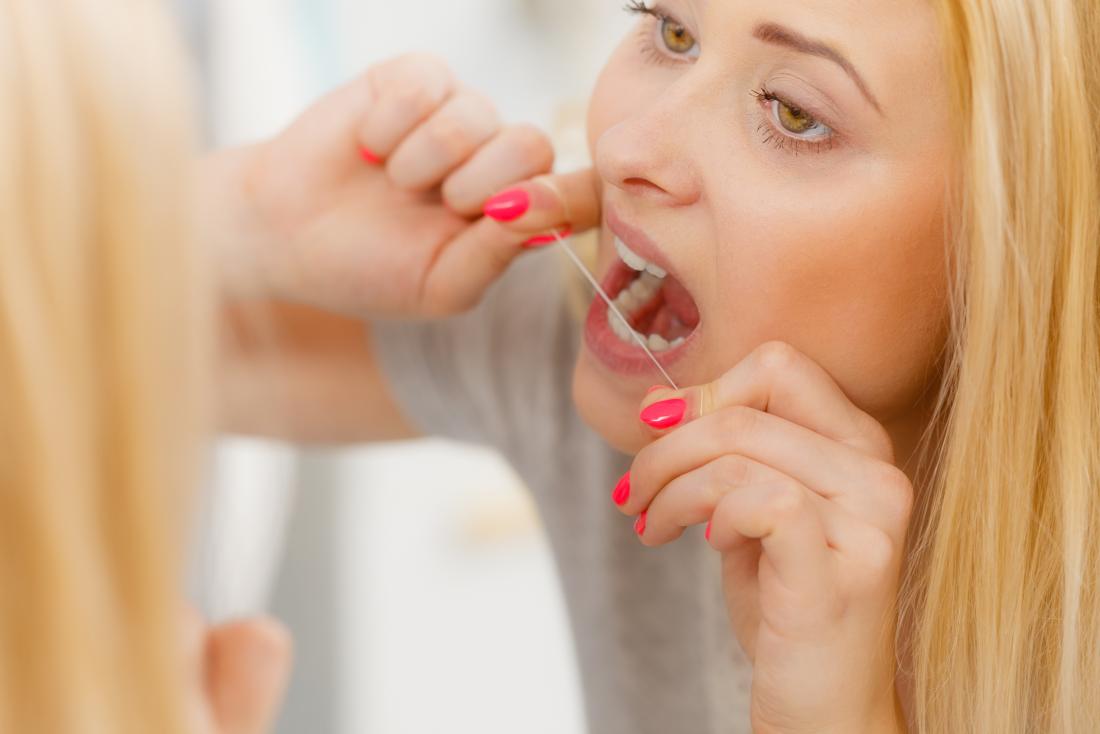However, when a person is unable to get rid of the taste by rinsing and brushing, it may be wise to see a doctor or dentist. They can determine the underlying cause.
Read on to learn more about the causes and treatments of a persistent bad taste in the mouth.
Types of bad taste

It may be recommended to see a dentist if a person is unable to get rid of the bad taste in their mouth.
What qualifies as bad varies from person-to-person. However, a bad taste in the mouth may be classified as:
- bitter
- foul
- metallic
- salty
- sickly sweet
Causes
Each of the health issues and medical conditions listed below can cause a persistent bad taste in the mouth.
1. Poor oral hygiene
Poor oral hygiene or dental health issues such as cavities and gum disease, can contribute to a lingering bad taste. Infection, inflammation, and abscesses may also be involved.
Other symptoms of problematic oral hygiene include:
- bad breath (halitosis)
- bleeding gums
- red or swollen mouth tissue
- sensitive teeth
Brush, floss, and use a mouth rinse every day to prevent dental problems. It is also important to schedule regular dental cleanings and screenings.
2. Dry mouth
A dry or sticky mouth is caused by a lack of saliva. This symptom can accompany a lingering bad taste and bad breath.
Saliva is vital to oral health because it reduces the amount of bacteria and food particles in the mouth.
Dry mouth can be caused by:
- certain medications
- tobacco use
- advancing age
Some medical conditions, including nerve damage and diabetes, can also lead to a lack of saliva.
3. Acid reflux
Acid reflux happens when stomach acid travels upward through the esophagus. A sour taste in the mouth is a common symptom of acid reflux.
Other symptoms include:
4. Oral thrush
This infection is caused by an overgrowth of the Candida fungus.
Symptoms include:
- a bad taste and cottony feeling in the mouth
- cracking at the corners of the mouth
- difficulty eating or swallowing
- irritation or pain under dentures
- a loss of taste
- minor bleeding upon contact with the sores
- redness
- pain
- white sores that can resemble cottage cheese, which most often form on the tongue and inner cheeks.
Oral thrush tends to occur in infants, older adults, people with diabetes, and people taking some antibiotics. However, anyone can get oral thrush.
5. Respiratory infections
Infections of the tonsils, sinuses, and middle ear often cause an unpleasant metallic taste in the mouth.
People with respiratory infections may also have congestion, an earache, and a sore throat.
6. Hepatitis B
Hepatitis B is a viral infection of the liver, and it can cause a bitter taste in the mouth. Other symptoms include:
Hepatitis B is serious, and anyone who suspects it should seek treatment right away.
7. Hormonal changes
Hormonal changes in early pregnancy can impact the sense of taste and smell. Many report a metallic taste in the mouth, but it usually disappears as the pregnancy progresses.
Hormonal changes linked to menopause may also cause dry mouth, which is often accompanied by a bitter taste.
8. Medications
Medications that can cause a bitter or metallic taste in the mouth include:
- antibiotics
- antidepressants
- anti-inflammatories
- antihistamines
- anti-seizure drugs
- cardiac medications
- diabetes medications
- gout medications
- HIV protease inhibitors
- oral contraceptives
Other medications may cause dry mouth, which affects the sense of taste.
9. Dietary supplements

If the dose of dietary supplements is reduced the metallic taste may disappear.
Vitamins and supplements known to cause a metallic taste in the mouth include:
Multivitamins and prenatal vitamins may contain some of these nutrients.
The bad taste should disappear as the body processes the supplement or if the dose is reduced.
10. Cancer therapies
Chemotherapy and radiation are known to cause an unpleasant taste in the mouth. The taste is usually metallic or sour.
11. Neurological conditions
When nerves in the brain are damaged, the sense of taste may be altered. Neurological conditions that can cause a bad taste in the mouth include:
An injury to the head may have a similar effect.
12. Exposure to chemicals
A person exposed to high levels of mercury or lead may inadvertently inhale these chemicals, causing a metallic taste in the mouth.
Treatment

Brushing and flossing may be an effective home treatment to resolve a bad taste in the mouth.
Treatment for a lingering bad taste in the mouth depends on the cause.
Before making a diagnosis, a doctor will usually take a full medical history and inquire about other symptoms. They may need to order certain tests.
Treatment may not be necessary, for example, if the cause of the taste is changing hormones. Viral infections can also clear up without treatment, and the taste should disappear.
When treatment is required, options include:
Adjusting medications or supplements
If a medication or supplement is responsible for the taste, a doctor may suggest an alternative, or change the recommended dosage.
If a cancer therapy is causing the taste, it will usually go away as the treatment finishes.
Addressing medical conditions
Treating the underlying condition will usually put an end to the bad taste in the mouth.
If dental cavities, gum disease, or other oral health issues are causing the taste, a dentist will recommend a procedure, medication, or medicated mouth rinse.
Home remedies
In some cases, home remedies can help to resolve a bad taste in the mouth. These should usually be used in conjunction with medical or dental treatment.
Some effective home remedies include:
- brushing, flossing, and using mouthwash daily
- chewing sugar-free gum to encourage the production and movement of saliva
- drinking enough water each day
- quitting tobacco use
- limiting or avoiding the intake of alcohol, caffeine, and sodas
- cutting down on the amount of sugar consumed, as it can contribute to oral thrush
- avoiding acid reflux triggers, such as fatty or spicy foods
Takeaway
Many issues can cause a bad taste to linger in the mouth, but it is highly treatable. See a doctor for a diagnosis and to ensure that no further complications arise.
In the meantime, several home remedies can improve oral hygiene and provide temporary relief from a bad taste in the mouth.
Let’s block ads! (Why?)





